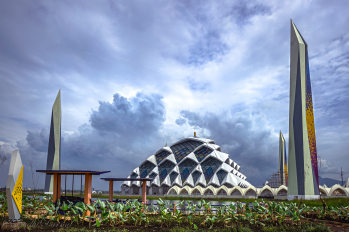
With an increase in blasphemy cases in Indonesia and arrests based on Islamic fatwas and mob pressure, rights advocates are calling for laws to be amended or ended.
The number of charges registered under Indonesia’s blasphemy law increased from 10 in 2021 to 19 last year, according to rights group The Setara Institute.
Total blasphemy convictions have risen to 150 since Indonesia’s blasphemy law went into effect in 1965, according to Human Rights Watch, with most of those taking place during the presidency of Susilo Bambang Yudhoyono from 2004 to 2014; during that span, convictions went from fewer than 10 to 125, according to Newthinking.com.
Among the 20 blasphemy convictions since 2015 was that of Christian convert Muhammad Kece, who received a 10-year prison sentence on April 6, 2022 for YouTube posts critical of the prophet of Islam. Kece was sentenced for both blasphemy and hate speech.
His conviction was preceded by the two-year imprisonment of former Jakarta Gov. Basuki Tjahaya “Ahok” Purnama, a Christian, after 100,000 people rallied against him for referencing a passage of the Koran during a campaign speech in late 2016. Purnama was convicted of blasphemy in 2017.
Kece, a former Muslim cleric, was arrested on Aug. 24, 2021 at a friend’s home in Bali after authorities accused him of posting videos on YouTube insulting Muhammad and Islam, according to the U.S. Commission on International Religious Freedom.
Kece was accused of “disseminating information aimed at inflicting hatred or dissension on individuals and/or certain groups of community based on ethnic groups, religions, races, and inter-groups” in conjunction with Article 28(2) of the Electronic Information and Transaction (ITE), and/or “insulting a religion” or “preventing a person from adhering to any religion based on a belief in God.”
Convicted at Ciamis District Court in West Java Province, Kece was sentenced as thousands of Muslims gathered outside the courtroom to demand he be severely punished. A former teacher at an Islamic boarding school who went on the hajj pilgrimage to Mecca, Saudi Arabia three times, Kece came to faith in Christ in 2014.
Police accused Kece of posting at least 400 YouTube videos insulting Islam since converting. His attorney said the sentence was harsh compared with other such cases, and Christian leaders at the time said the sentence appeared to be discriminatory, according to UCANews.
The Setara Institute in July disclosed that it had encouraged police “to stop or at least implement a moratorium on the use of religious blasphemy articles” and had asked the government to revise or even eliminate the blasphemy legislation.
Bonar Tigor Naipospos, the group’s deputy chairman, told UCANews that police in nearly all blasphemy cases base charges on fatwas issued by Islamic organizations such as the Indonesian Ulema Council (MUI). Religious opinions cannot be used as a formal basis for legal action by the state, he said.
Naipospos told UCANews that the articles related to blasphemy “are problematic legal provisions, with criminal elements that are vague and do not provide legal certainty.” From 2007 to 2022, the institute found the articles were “often used to arbitrarily criminalize certain parties” and appear to be more of a “trial by mob,” he said.
In addition to the blasphemy law, in 2008 the government enacted the electronic transmission law that sets punishment of up to six years in prison for those who post blasphemous content via the internet against any of the country’s official religions – Islam, Protestantism, Catholicism, Hinduism, Buddhism and Confucianism.
Zastrouw Al-Ngatawi, one of the scholars of the Islamic organization Nahdlatul Ulama, wrote in NUOnline in February 2019 that blasphemy prosecution suffers from lack of valid evidence and incoherent arguments, with defendants still convicted because of public pressure. Defense witnesses are reluctant to testify because they fear pressure and intimidation, he added.
Zastrouw added that many officials prioritize peace and order over formal legal requirements, forcing members of marginalized communities to surrender their rights.
Indonesia ranked 33rd on the Christian support organization Open Doors’ 2023 World Watch List of the 50 countries where it is most difficult to be a Christian. Indonesian society has adopted a more conservative Islamic character, and churches involved in evangelistic outreach are at risk of being targeted by Islamic extremist groups, according to Open Doors’ WWL report.
“If a church is seen to be preaching and spreading the gospel, they soon run into opposition from Islamic extremist groups, especially in rural areas,” the report noted. “In some regions of Indonesia, non-traditional churches struggle to get permission for church buildings, with the authorities often ignoring their paperwork.”





